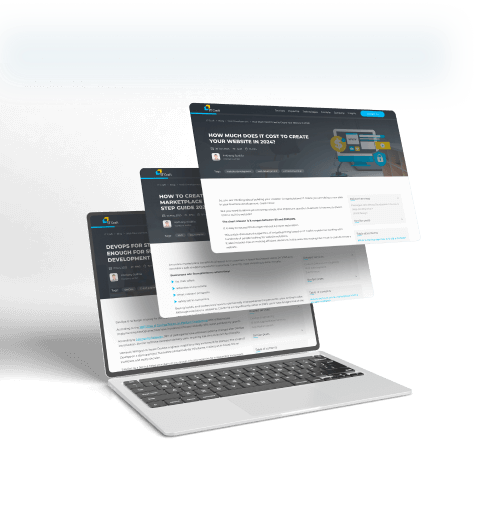Low-cost. Adjustable. Energy-efficient.
iBeacons technology enables new experiences and workflows at a reasonable cost.
The essence of iBeacons is position tracking. But with a few adjustments, they can do so much more.
Little wonder that developers have adopted iBeacons for various uses. Each iBeacon drives value for consumers and businesses alike when they choose either an Android or iOS iBeacon app.
How?
Keep reading. Find out how businesses boost end-user experiences and where iOS iBeacons apps make the most sense.
1
What is an iBeacon App? How Is It Used?
iBeacon is a universal BLE (Bluetooth Low Energy) protocol. It is used in tiny devices called beacons. Beacons emit systematic signals using the iBeacon protocol.
Beacon devices can be mounted on walls or attached to objects and people.
As a standalone, iBeacon makes little sense. Beacons neither track anything nor collect any data. They require specially built software that can interpret signals e.g., an iBeacon iPhone app.
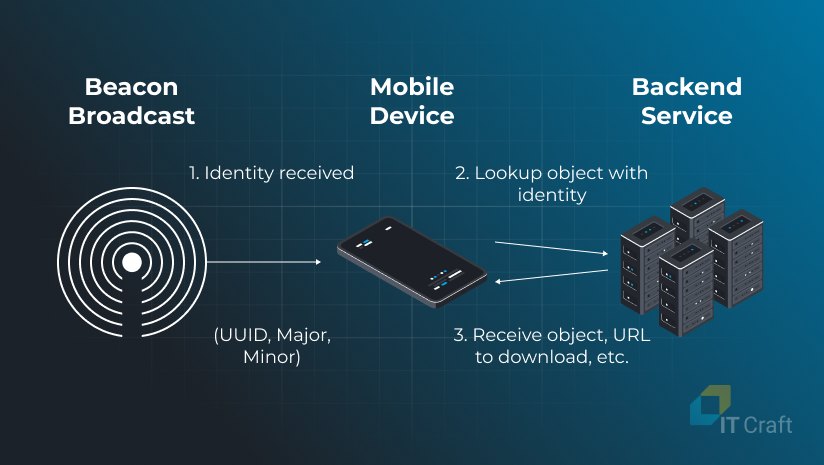
Other Bluetooth-equipped devices detect emitted signals and interpret them with the help of apps. Apps trigger an event based on the strength of the signal level.
Common use cases include:
- establish a route
- determine their location
- locate other people and assets
- receive promotional and informational messages, and more
Another cost-saving benefit iBeacon provides: it is a universal protocol, so developers can integrate it into both Android and iOS iBeacon apps—both effectively recognize the signals.
2
Why is an iOS iBeacon App Better than an App Using NFC or GPS?
Is there anything that makes iBeacon better than any other tracking technology?
Short answer: iBeacon is not better. It is different.
The choice of tech stack iBeacons vs. NFC vs. GPS depends solely on business goals.
iBeacon. Beacons have a long battery life and effective signal range up to 164 ft. (50 m). They work best for indoor guidance, position tracking, and data analytics. The latter means that Android and iOS iPhone apps collect depersonalized statistics that businesses use for different purposes, e.g., to optimize facility usage.
NFC. NFC has a narrow range of up to 4 in (10 cm), thus demanding close proximity for successful operations. It requires no energy and provides secured data communication. Businesses use NFC widely for payments or other types of secure data transactions.
Although payments using an iOS iBeacon app are possible, NFC is considered a more secure option.
GPS. GPS is suited only for the outdoors. It simply does not work indoors. Developers use GPS for positioning and location tracking when users must navigate between two facilities, e.g., inside a university campus.
Conversely, beacons excel indoors but are limited outdoors.
3
IT Craft’s Expertise
Here are two examples of IT Craft’s expertise and experience increasing the bottom lines of two iBeacon technology startups.
InNav
InNav is a fully custom indoor navigation platform. It is based on several technologies, including iBeacon, to provide app users with world-class navigation services across multiple venue types. The InNav app uses custom algorithms to calculate an optimum path inside a facility—or even between two facilities—then guides users to their selected point of destination. Beacons work best for walled levels.
The app also helps friends locate each other. And its unique functionality for parents helps them know where their children are at all times, thus eliminating stressful situations of children straying and getting lost.
InNav also caters to retail business needs by activating promo and alert notifications with the help of marketing beacons.
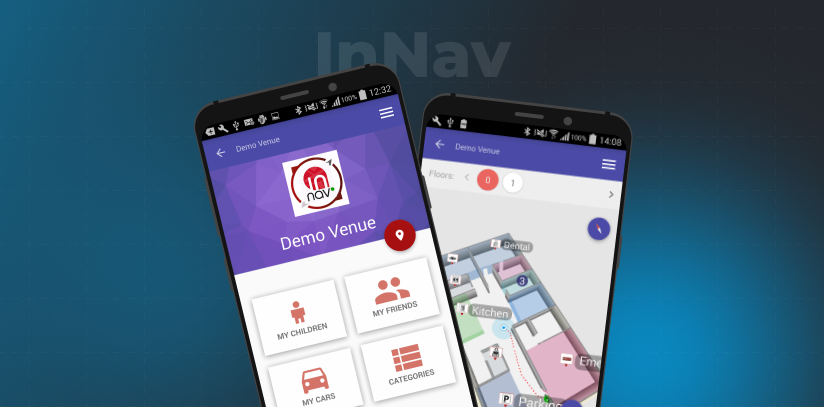
iCafe
iCafe is an interactive app that helps coffee lovers to set up, store, and share digital coffee cards. Customers can pay using PayPal or WeChat, thus decreasing the wait when queueing for a cup of coffee.
The app allows café owners to efficiently manage their workflow: prepare a menu, place orders, store client info, accept payments, and more.
iCafe also provides iBeacon-based functionality for creating marketing campaigns. Café owners can send discounts and special offers to customers. Beacons detect a customer’s proximity to the café and activate notifications at the right moment.
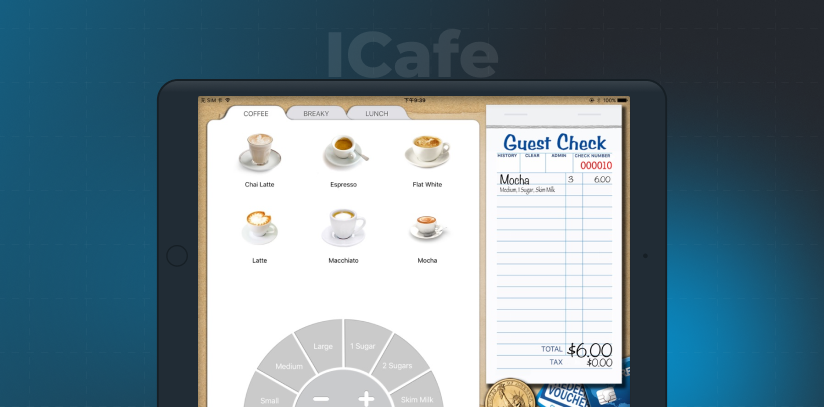
4
Using iOS iBeacon Apps in Different Industries
iOS iBeacon apps help track anything or anyone.
Users can find friends, children, or even lost dementia patients.
The best thing about beacons is you can customize them to suit your needs. Businesses get beacons configured right at the factory when placing a large order.
Customization includes:
- custom functional parameters
- branded cap matching logo, color, size, shape, etc. ( Estimote even offers wooden caps for its beacons.)
- extra sensors
Extra sensors help determine environmental conditions and item movement. These include:
- motion
- gyroscope
- temperature
- humidity
- pressure (used as altimeter)
- other unique add-ons
The following industries benefit from adopting iBeacon-based apps:
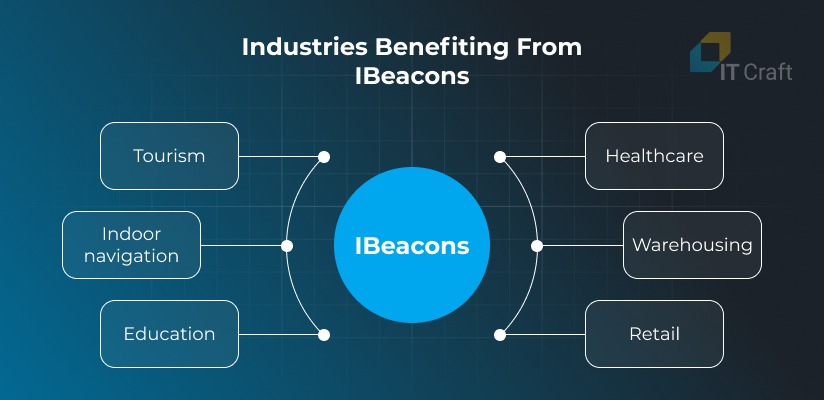
Indoor Navigation
Facility owners can introduce beacon solutions inside different venue types such as shopping malls, airports and train stations, universities, office buildings, and more to:
- Determine exact position on a facility map.
- Guide users to the destination point inside a building.
- Help find the car in a parking garage or an exit to public transportation.
- Create a safe route for people with special needs.
Tourism
Beacons are used inside hotels and for museums, exhibitions, and popular tourist attractions to:
- Automate check-ins and check-outs at hotels making distancing between guests and personnel possible.
- Activate content in visitors’ native language when they approach a specific location.
- Entertain children with quizzes and mini-games.
- Send promo information about planned events and extra services.
Education
As part of a tracking system, beacons monitor students riding on a school bus. Bus drivers scan students’ beacons to:
- Monitor children on their way to and back from school.
- Send information about students present to the server.
- Ensure parents know their children’s location.
- Provide school principals with attendance information.
Healthcare
iBeacon apps make it possible to:
- Navigate patients through clinic facilities.
- Trigger emergency notifications to doctors.
- Update notifications to patients sitting in the waiting room.
- Keep track of expensive clinic equipment.
Warehousing
Beacons help organize workflows inside large warehouses to:
- Find needed items and equipment faster, eliminating idle time.
- Monitor storage conditions (temperature, humidity, etc.)
- Map and test new flows thus, save on workload optimization.
- Simplify personnel access to different, also restricted, areas.
Retail
Businesses create and manage context-based marketing campaigns. Beacons and iBeacon tags:
- Activate promotional notifications, special offers, or discounts based on predetermined parameters, e.g., user proximity to certain items, repeat users, etc.
- Activate relevant information for products on shelves (price, available colors, material, and more) when visitors pick them up.
- Help collect analytics such as time visitors spend and their behavior inside the store.
- Help determine the most popular spots via heatmaps.
5
How Much Does It Cost to Develop an iOS iBeacon App?
The minimum cost to create a simple iOS iBeacon app starts at $30,000 for basic functionality. As with all development, costs depend on complexity.
Read about development cost estimates.
Factor in installation and maintenance when calculating costs of an iOS iBeacon app:
- Costs of beacons depend on room space. Large spaces require more beacons (discounts apply for large volumes).
- Regular subscriptions for location engines and specific iBeacon services.
- Costs of own servers needed to store specific data (e.g., for marketing campaigns).
- Map and software updates.
- Replacement of dead batteries and beacons.
!
Conclusion
iBeacon protocol fits into a wide application range, from navigation and tracking assets to running a powerful, context-based promo campaign.
To create the desired user experience, you need to take into account influencing factors and specific details. Your app might use several technologies.
To ensure you get what you want and meet the delivery deadline at a reasonable price, you must be precise about your app’s goals and value proposition.
To turn your plan into an iOS iBeacon app, you need an expert team.
